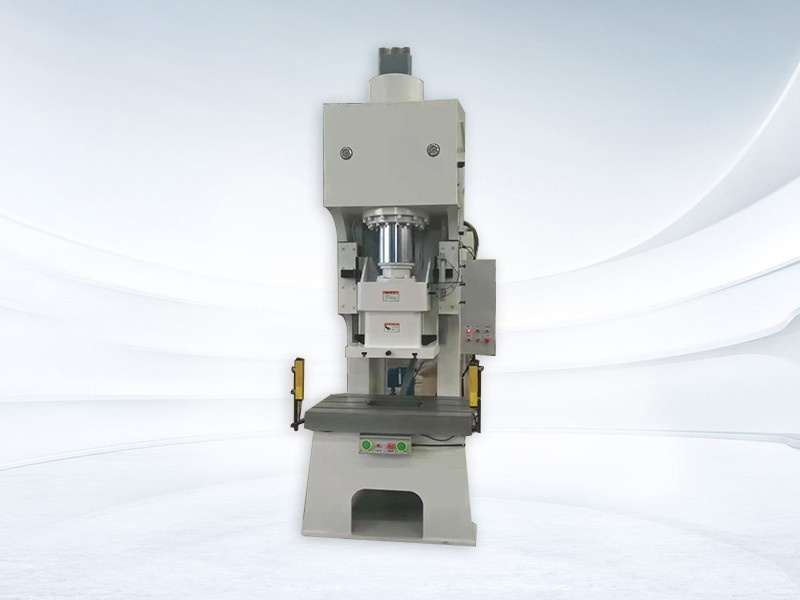In the field of industrial manufacturing, hydraulic punch presses have become an indispensable key equipment in the production process of many enterprises due to their powerful pressure output, stable performance, and wide application range. Hydraulic punching machines play an important role in both stamping and forming of automotive components and precision machining of electronic products. However, there are numerous models, specifications, and functions of hydraulic punch presses in the market. For enterprises or individuals with procurement needs, how to accurately determine which hydraulic punch press truly meets their needs from among the many products has become an urgent problem to be solved. So, how to determine whether the hydraulic punch press meets the requirements?

1. Clarify one's own production needs
Processing type: First determine the processing operation you want to perform, such as simple punching and cutting, or complex stretching and bending forming. If it is large-scale stretching processing of car body coverings in automobiles manufacturing, it is necessary to choose hydraulic punching machines with high pressure and long stroke; If punching small hardware parts, the requirements for pressure and stroke are relatively low.
Processing materials: Different materials have different requirements for hydraulic punch presses. When processing high-strength steel, hydraulic punching machines need to have greater pressure and stronger structures; However, when processing softer aluminum alloy materials, the requirements for equipment pressure are not as high. For example, in the aerospace industry, processing titanium alloy parts requires hydraulic punch presses that can provide high pressure and good stability.
Production scale: Consider your own production scale, whether it is large-scale production or small-scale customization. When producing in large quantities, it is necessary to choose hydraulic punch presses with high automation and fast production efficiency, such as equipment equipped with automatic feeding devices and rapid mold changing systems; Small batch customized production places more emphasis on the flexibility and versatility of equipment.
2. Investigate equipment performance parameters
Pressure: The pressure of a hydraulic punch press is one of the key parameters, and the required pressure should be determined based on the thickness and hardness of the processed material. Generally speaking, processing thicker and harder materials requires greater pressure. For example, processing a 10mm thick steel plate may require hundreds or even thousands of tons of pressure.
Travel: The travel determines the distance of the slider's up and down movement, and the appropriate travel should be selected based on the height of the processed part and the size of the mold. If the processed parts are high or the mold is large, a longer stroke is required.
Speed: including the running speed and return speed of the slider. The fast running speed of the slider can improve production efficiency, but the stability and processing quality of the equipment should also be considered. For example, in some high-speed stamping production lines, the running speed of the slider may reach several hundred times per minute.
Accuracy: Processing accuracy directly affects the quality of the product. Attention should be paid to the positioning accuracy, repeatability accuracy, and other indicators of hydraulic punching machines. For some products that require high dimensional accuracy, such as stamping electronic components, it is necessary to choose high-precision hydraulic punching machines.
3. Consider cost budget
Equipment purchase cost: The prices of hydraulic punch presses of different brands, models, and specifications vary greatly. Imported equipment is usually expensive, but may have certain advantages in technology and quality; Domestic equipment has relatively lower prices and may offer higher cost-effectiveness. Choose appropriate equipment based on your budget.
Operating costs: including the consumption of hydraulic oil, electricity, equipment maintenance costs, etc. Some energy-saving hydraulic punch presses can reduce operating costs. For example, hydraulic punch presses using variable frequency speed regulation technology can adjust the motor speed according to processing requirements, thereby saving electricity.
Post upgrade cost: Considering the future development of production, it is necessary to understand the upgrade potential and cost of the equipment. If the equipment can be modularized and upgraded to add new features or improve performance, it can save the cost of replacing equipment in future production.
4. Understand the after-sales support situation
After sales service network: Choose a supplier with a comprehensive after-sales service network, so that you can receive timely repair and support in case of equipment failure. Understand the distribution of suppliers' after-sales service stations in the local area, as well as the response time of maintenance personnel.
Training services: It is also important for suppliers to provide operational and maintenance training services. After professional training, operators can correctly use and maintain equipment, reduce the occurrence of equipment failures, and improve production efficiency.
Spare parts supply: Ensure that suppliers can provide equipment spare parts in a timely manner. If spare parts are not supplied in a timely manner, equipment downtime will be prolonged, affecting production progress. Understand the supplier's spare parts inventory situation and spare parts supply cycle.
To determine whether a hydraulic punch press meets one's own needs, multiple factors need to be considered comprehensively, from production requirements, performance parameters to brand after-sales service, each link is crucial. Only through comprehensive and detailed analysis and comparison can the hydraulic punch press that best meets one's production requirements be selected. In the process of purchasing, one should not blindly pursue low prices or high-end configurations, but should weigh the pros and cons according to the actual production situation and make wise decisions. Choosing a hydraulic punch press that meets the requirements can not only improve production efficiency and ensure product quality, but also save costs and create greater economic benefits for the enterprise. I hope the above content can provide useful reference and guidance for those who have procurement needs for hydraulic punching machines.

 Address:Room 1202, Detaitang Building, No. 118 Huaguang Road, Zhangdian District, Zibo, Shandong
Address:Room 1202, Detaitang Building, No. 118 Huaguang Road, Zhangdian District, Zibo, Shandong WhatsApp:+8615653328535
WhatsApp:+8615653328535 Wechat: +8615965331535
Wechat: +8615965331535  E-mail:zs@sdsmachinery.com
E-mail:zs@sdsmachinery.com